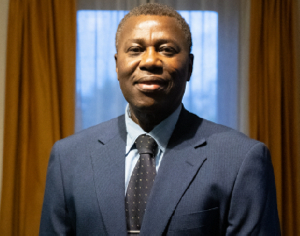Accra, Nov. 30, GNA - The negative effect of the mass migration health professionals in the West Africa Sub-Region have become alarming as Ghana lost 2,050 clinical staff to the developed countries within the last five years, Dr Antwi Boasiako, Director of Human Resource Development of the Ministry of Health, said on Thursday. He said out of the number, nurses and midwives were 1,235; medical officers 472 and pharmacists, 343.
Dr Boasiako said this when he opened a two-day sub-regional workshop of the Public Service International (PSI) and affiliated medical health trade unions in Accra involving Ghana, Nigeria, Sierra Leone and Liberia under the theme: 93Building Alliance among Medical Health Trade Unions.=94
It is to build stronger network to enhance effective communication, cooperation among affiliated medical trade unions; deepen the understanding of leadership roles in global trends in the health service delivery systems; advocate increased spending for quality health care and human resources and campaign for good policies and rules concerning ethical guidelines on international recruitment of trained and skilled health professionals from the Sub-Region.
Dr Boasiako noted that Ghana has put in measures to control the situation, which included paying appropriate compensations to health workers through the introduction of new salaries, incentives and car and housing loans.
=93On the other side of the coin, we have strengthened bonding formalities for all categories of programmes sponsored by the Ministry of Health. All sponsored trainees are also made to sign bonds to serve the country for stipulated periods of time and sponsored trainees are informed of the total cost of training and bond sum during admission.=94
He called for measures to counsel potential emigrants and the need to campaign for the application for ethical guidelines on international recruitment of health personnel to safeguard their welfare. Mr Kwasi Adu Amankwa, Secretary-General of Ghana's Trade Union Congress, noted that unions were active in the colonial days but for some decades now unions have moved to another direction looking at fresh challenges facing them today.
He entreated participants to put their efforts together since they had similar objectives and policy issues to achieve better results. =93It is only when we are strong that we can make an impact as health workers so we should come together as one and move towards organizational unity=94, he said.
Mr Alan Leather of PSI Headquarters in France said poverty could not be tackled without looking at the health sector, which was the central point. He called on governments to ensure that their health workers were paid decently and worked under better conditions adding: 93It is unacceptable that at this time and age there are health workers, who earn below the average rate.=94 Mr Teko Kpoda, Regional Secretary for the Africa and Arab countries of PSI, noted that the issue facing the various affiliates were global and urged governments to increase the funding to health services, adding =93a healthy nation is a wealthy nation=94. 30 Nov. 06
Health News of Thursday, 30 November 2006
Source: GNA












